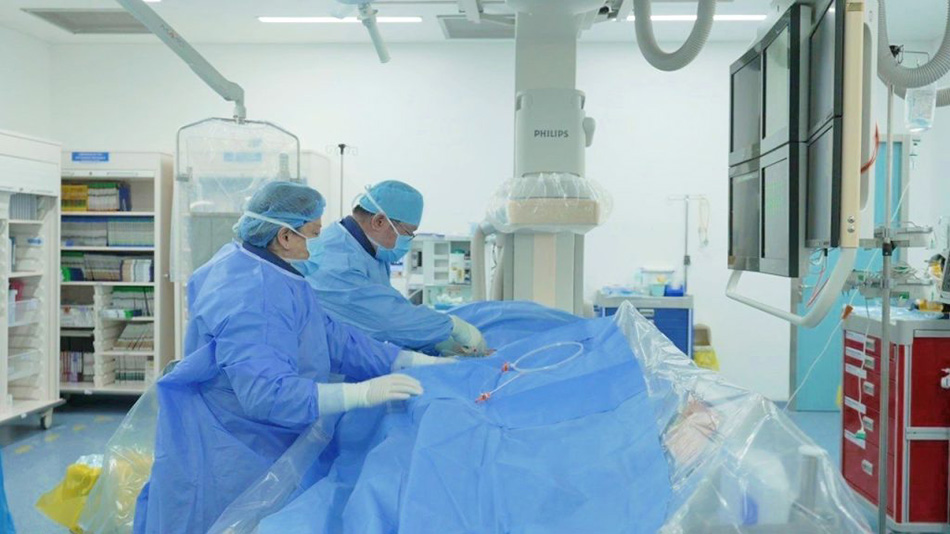Table of contents
Atrial fibrillation (AF), a common cardiac arrhythmia, is a leading cause of heart failure and stroke. Today, modern treatment approaches, such as radiofrequency ablation combined with a 3D mapping system, provide an effective solution to correct irregular heartbeats and restore a normal heart rhythm.
Atrial Fibrillation: A Life-Threatening Risk at Any Age
Mrs N.T.T., 81 years old, was admitted to FV Hospital’s emergency care with severe shortness of breath and heart failure. After ruling out underlying conditions such as hyperthyroidism, coronary artery disease, and gastroesophageal reflux disease, doctors diagnosed her with heart failure due to prolonged persistent atrial fibrillation.

At the Cardiology and Interventional Cardiology Department, doctors developed a treatment plan using advanced atrial fibrillation ablation combined with a 3D mapping system. Patient T. recovered quickly, her breathing difficulties resolved, her sleep improved, and her heart function returned to near normal.
Dr Hoang Quang Minh from FV Hospital’s Cardiology and Interventional Cardiology Department noted that emergency hospitalizations due to atrial fibrillation, like Mrs T.’s case, have been on the rise in recent years.
“Atrial fibrillation is a condition in which the heart beats irregularly and quivers instead of maintaining a steady rhythm. A normal heart rate ranges from 60 to 100 beats per minute, but with atrial fibrillation, it can surge to 200–300 beats per minute. This disrupts blood circulation and can lead to clot formation. These clots may travel to the brain, causing a stroke,” Dr Minh explained.
Statistics show that one in four stroke cases is caused by atrial fibrillation. In Vietnam, thousands of people suffer strokes annually due to complications from this condition, with a high rate of mortality and disability. Atrial fibrillation is not limited to the elderly; it is increasingly affecting younger individuals, particularly those with unhealthy lifestyles. Common risk factors include physical inactivity, obesity, smoking, and excessive alcohol consumption. Additionally, factors such as staying up late, working night shifts, stress, acid reflux, and irregular routines further increase the risk of developing this condition.

Atrial fibrillation is also more likely to occur in individuals with a history of cardiovascular disease, hypertension, or thyroid disorders. According to Dr Minh, recognising early warning signs such as a rapid heartbeat, palpitations, shortness of breath, or unexplained fatigue is crucial, as early detection allows for timely medical examination and treatment.
Applying Modern Technology to Correct Irregular Heart Rhythms
The treatment of atrial fibrillation has advanced significantly with modern technology, particularly through the use of radiofrequency ablation combined with a 3D mapping system.
“This system helps doctors precisely identify the areas of the heart that need treatment, thereby increasing effectiveness and minimizing complications. Studies show that if detected and treated in time, this method achieves a success rate of up to 98-99%,” Dr Minh emphasised.
According to Dr Minh, FV Hospital has implemented a range of advanced heart rhythm monitoring technologies, including 24-hour, 7-day, and 30-day ECG monitoring to track irregular heart rhythms over an extended period. Additionally, implantable loop recorders can monitor heart activity for up to three years. These technologies allow for early detection of abnormal heart rhythms, even in patients without noticeable symptoms, significantly reducing the risk of serious complications such as heart failure or stroke.

Atrial fibrillation often goes unnoticed until complications arise. Most patients are diagnosed at a late stage, only after experiencing symptoms such as heart failure, stroke, or blood clots. Dr Minh emphasises the importance of proactive heart rhythm monitoring, particularly for individuals at risk. Additionally, maintaining a healthy lifestyle, managing body weight, and reducing alcohol and tobacco are simple yet effective ways to protect heart health.
With the continuous advancement of medicine and technology, atrial fibrillation is no longer a life-threatening condition if managed properly. The key is for individuals to take responsibility for their health, pay attention to their bodies, and seek medical care at the first signs of abnormal heart rhythms. “Early screening and detection of atrial fibrillation not only saves lives but also helps patients improve their quality of life and reduce the financial burden of treating complications,” Dr Minh advises.
For more information about atrial fibrillation screening and treatment, readers can contact the Cardiology and Interventional Cardiology Department at FV Hospital at (028) 54 11 33 33.



